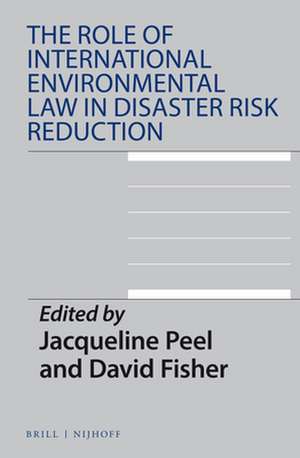The Role of International Environmental Law in Disaster Risk Reduction: International Environmental Law, cartea 12
Editat de Jacqueline Peel, David Fisheren Limba Engleză Hardback – 20 apr 2016
Din seria International Environmental Law
- 18%
 Preț: 1206.89 lei
Preț: 1206.89 lei - 18%
 Preț: 706.25 lei
Preț: 706.25 lei - 18%
 Preț: 941.78 lei
Preț: 941.78 lei - 18%
 Preț: 728.67 lei
Preț: 728.67 lei - 18%
 Preț: 838.16 lei
Preț: 838.16 lei - 18%
 Preț: 704.71 lei
Preț: 704.71 lei - 18%
 Preț: 595.60 lei
Preț: 595.60 lei - 18%
 Preț: 724.13 lei
Preț: 724.13 lei - 18%
 Preț: 754.16 lei
Preț: 754.16 lei - 18%
 Preț: 640.42 lei
Preț: 640.42 lei - 18%
 Preț: 696.90 lei
Preț: 696.90 lei - 18%
 Preț: 699.03 lei
Preț: 699.03 lei - 18%
 Preț: 615.02 lei
Preț: 615.02 lei - 18%
 Preț: 790.52 lei
Preț: 790.52 lei - 18%
 Preț: 652.16 lei
Preț: 652.16 lei - 18%
 Preț: 906.24 lei
Preț: 906.24 lei - 18%
 Preț: 726.04 lei
Preț: 726.04 lei - 18%
 Preț: 1208.63 lei
Preț: 1208.63 lei
Preț: 893.36 lei
Preț vechi: 1089.46 lei
-18% Nou
Puncte Express: 1340
Preț estimativ în valută:
170.97€ • 177.83$ • 141.14£
170.97€ • 177.83$ • 141.14£
Carte indisponibilă temporar
Doresc să fiu notificat când acest titlu va fi disponibil:
Se trimite...
Preluare comenzi: 021 569.72.76
Specificații
ISBN-13: 9789004318809
ISBN-10: 9004318801
Pagini: 480
Dimensiuni: 155 x 235 mm
Greutate: 0.82 kg
Editura: Brill
Colecția Brill | Nijhoff
Seria International Environmental Law
ISBN-10: 9004318801
Pagini: 480
Dimensiuni: 155 x 235 mm
Greutate: 0.82 kg
Editura: Brill
Colecția Brill | Nijhoff
Seria International Environmental Law
Cuprins
Chapter 1: International Law at the Intersection of Environmental Protection and Disaster Risk Reduction
Jacqueline Peel and David Fisher
Part 1: The (Porous) Border Between Disaster Law and Environmental Law
Chapter 2: Climate Change and the Narrative of Disaster
Lisa Grow Sun
Chapter 3: Disaster Law in the Anthropocene
Daniel Farber
Chapter 4: A Capabilities Approach to Defining Climate Disasters
Rosemary Lyster
Chapter 5: Resilient Incoherence – Seeking Common Language for Climate Change Adaptation, Disaster Risk Reduction, and Sustainable Development
Anne Siders
Chapter 6: Disastrous Adaptation
Cinnamon P. Carlarne
Part 2: Using Environmental Law Tools for Disaster Risk Reduction
Chapter 7: Disaster Risk Assessment: An Appraisal of European Union Environmental Law
Denis Edwards
Chapter 8: The Potential Role of International Environmental and Water Law to Prevent and Mitigate Water-Related Disasters
A. Dan Tarlock
Chapter 9: Water Treaty Regimes as a Vehicle for Cooperation to Reduce Water-related Disaster Risk - The Case of Southern Africa and the Zambesi Basin
Mary Picard
Chapter 10: Valuing Foreign Disasters in International Environmental Law
Arden Rowell & Lesley Wexler
Chapter 11: Liability and Compensation as Instruments of Disaster Risk Mitigation?
Michael G. Faure
Part 3: Linking Institutions and Approaches in the Environmental and Disaster Risk Management Fields
Chapter 12: The UN SDGs and Environmental Law: Cooperative Remedies for Natural Disaster Risks
Nicholas A. Robinson
Chapter 13: International Frameworks Governing Environmental Emergency Preparedness and Response: An Assessment of Approaches
Carl Bruch, Rene Nijenhuis & Shanna N. McClain
Chapter 14: Preventing and Responding to Arctic Offshore Drilling Disasters: The Role of Hybrid Cooperation
Hari M. Osofsky, Jessica Shadian & Sara L. Fechtelkotter
Chapter 15: Overlapping International Disaster Law Approaches with International Environmental Law Regimes to Address Latent Ecological Disaster
Anastasia Telesetsky
Chapter 16: Afterword: Environmental Disasters and Human Rights
John H. Knox
Jacqueline Peel and David Fisher
Part 1: The (Porous) Border Between Disaster Law and Environmental Law
Chapter 2: Climate Change and the Narrative of Disaster
Lisa Grow Sun
Chapter 3: Disaster Law in the Anthropocene
Daniel Farber
Chapter 4: A Capabilities Approach to Defining Climate Disasters
Rosemary Lyster
Chapter 5: Resilient Incoherence – Seeking Common Language for Climate Change Adaptation, Disaster Risk Reduction, and Sustainable Development
Anne Siders
Chapter 6: Disastrous Adaptation
Cinnamon P. Carlarne
Part 2: Using Environmental Law Tools for Disaster Risk Reduction
Chapter 7: Disaster Risk Assessment: An Appraisal of European Union Environmental Law
Denis Edwards
Chapter 8: The Potential Role of International Environmental and Water Law to Prevent and Mitigate Water-Related Disasters
A. Dan Tarlock
Chapter 9: Water Treaty Regimes as a Vehicle for Cooperation to Reduce Water-related Disaster Risk - The Case of Southern Africa and the Zambesi Basin
Mary Picard
Chapter 10: Valuing Foreign Disasters in International Environmental Law
Arden Rowell & Lesley Wexler
Chapter 11: Liability and Compensation as Instruments of Disaster Risk Mitigation?
Michael G. Faure
Part 3: Linking Institutions and Approaches in the Environmental and Disaster Risk Management Fields
Chapter 12: The UN SDGs and Environmental Law: Cooperative Remedies for Natural Disaster Risks
Nicholas A. Robinson
Chapter 13: International Frameworks Governing Environmental Emergency Preparedness and Response: An Assessment of Approaches
Carl Bruch, Rene Nijenhuis & Shanna N. McClain
Chapter 14: Preventing and Responding to Arctic Offshore Drilling Disasters: The Role of Hybrid Cooperation
Hari M. Osofsky, Jessica Shadian & Sara L. Fechtelkotter
Chapter 15: Overlapping International Disaster Law Approaches with International Environmental Law Regimes to Address Latent Ecological Disaster
Anastasia Telesetsky
Chapter 16: Afterword: Environmental Disasters and Human Rights
John H. Knox
Notă biografică
Jacqueline Peel, Ph.D. (2007), University of Melbourne, is a Professor of Law at Melbourne Law School. She has published monographs and numerous articles on environmental and climate change law, including a co-authored text, Principles of International Environmental Law.
David Fisher is the global Disaster Law Programme Coordinator for the International Federation of Red Cross and Red Crescent Societies, leading its work providing legislative advice, developing new international tools and researching new areas of law related to disasters.
David Fisher is the global Disaster Law Programme Coordinator for the International Federation of Red Cross and Red Crescent Societies, leading its work providing legislative advice, developing new international tools and researching new areas of law related to disasters.
